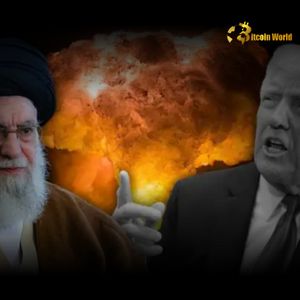Iran Israel: Hopeful Signals for De-escalation Emerge
4 min read
BitcoinWorld Iran Israel: Hopeful Signals for De-escalation Emerge In the dynamic world of global finance, including the ever-watchful cryptocurrency markets, geopolitical shifts in the Middle East are always a key consideration. Tensions between major regional players can send ripples through economies worldwide. Recently, a significant development suggests a potential shift in the ongoing Iran Israel dynamic, offering a glimmer of hope for reduced hostilities. Understanding the Iran Israel Dynamic For years, the relationship between Iran and Israel has been marked by significant tension and proxy conflicts across the region. This animosity stems from a complex mix of historical grievances, ideological differences, and competing strategic interests. While direct confrontation has been rare, indirect clashes and rhetoric have kept the region on edge, impacting everything from oil prices to investment sentiment in various markets, including how investors perceive regional stability. The recent exchange of direct fire marked a notable escalation, raising international alarm. However, amidst this heightened tension, signals are now emerging that suggest a potential off-ramp. Prospects for De-escalation: What Are the Signals? According to sources cited by The Wall Street Journal, Iran has reportedly expressed an interest in cooling down tensions with Israel. This interest was conveyed through Arab intermediaries, indicating a preference for diplomatic channels rather than continued confrontation. The use of intermediaries is a common tactic in complex geopolitical situations, allowing for communication without direct, formal recognition or engagement between adversaries. Furthermore, a report shared by Walter Bloomberg on X highlighted a specific condition mentioned by Iran for resuming discussions: the United States must remain uninvolved in the conflict. This condition underscores the intricate web of alliances and rivalries in the Middle East, where the role of global powers significantly influences regional dynamics. Let’s break down the key elements of these signals: Channel: Arab intermediaries are being used, suggesting a move towards indirect diplomacy. Goal: Expressed interest in de-escalating tensions. Condition: Resumption of talks contingent on U.S. non-involvement. These signals, while preliminary and requiring careful observation, represent a potential shift from the recent tit-for-tat exchanges. Why Middle East Stability Matters Globally The Middle East is a crucial geopolitical hub due to its energy resources, strategic waterways, and complex political landscape. Instability in this region has far-reaching consequences: Energy Markets: Disruptions can lead to volatile oil and gas prices, affecting global economies. Supply Chains: Key shipping lanes pass through the region, vulnerable to conflict. Refugee Flows: Conflict can trigger humanitarian crises and mass displacement. Global Security: Regional conflicts can attract external powers and fuel international terrorism. Financial Markets: Uncertainty leads to risk aversion, impacting stocks, bonds, and commodities, and yes, even the resilience of the crypto market can be tested by such external shocks. Therefore, any movement towards de-escalation is not just a regional matter but a development with global implications for geopolitics and economic stability. Geopolitics and the Crypto Market While the immediate news is about international relations, it’s important for anyone monitoring global markets, including crypto enthusiasts, to understand the broader context. Geopolitical events, particularly those involving major state actors and potential conflict, can significantly influence market sentiment. Periods of high tension often lead investors to seek safer assets, while signs of stability or de-escalation can foster a more risk-on environment. Although this specific news does not directly involve cryptocurrency, it falls under the umbrella of macro-geopolitical factors that savvy investors track. The interconnectedness of global finance means that developments in the Middle East, or any other volatile region, can indirectly affect liquidity, investor confidence, and market direction across asset classes. Challenges and Considerations Ahead While the signals for de-escalation are positive, several challenges remain: Trust Deficit: Decades of animosity have created a deep lack of trust between Iran and Israel. Conditionality: Iran’s condition regarding U.S. non-involvement is complex and may not be easily met or agreed upon by all parties. Proxy Activities: Even if direct tensions ease, activities by proxy groups supported by Iran in the region could continue to be a source of friction. Internal Politics: Both countries have internal political dynamics that can influence foreign policy decisions. Moving from signaling interest to actual talks and meaningful de-escalation is a long and challenging process requiring sustained diplomatic effort and flexibility from all sides. The role of Arab intermediaries will be crucial in navigating these complexities. Actionable Insight: Stay Informed For those interested in global markets, including the crypto space, the actionable insight here is the importance of monitoring geopolitical developments. Events like potential de-escalation in the Iran Israel conflict, shifts in Middle East dynamics, and broader geopolitics are not isolated incidents. They are part of the global tapestry that influences economic conditions and market sentiment. Staying informed allows for a more nuanced understanding of potential market volatility and risk factors beyond just asset-specific news. Conclusion: A Hopeful Sign for Regional Stability? The reports of Iran signaling a desire to de-escalate tensions with Israel, conveyed through Arab intermediaries and conditioned on U.S. non-involvement, offer a potentially hopeful turning point after a period of heightened direct confrontation. While significant hurdles remain, and the path to genuine regional stability is fraught with challenges, these signals are a reminder that diplomatic off-ramps are always possible, even between long-standing adversaries. Monitoring how these signals translate into action will be critical for understanding the future trajectory of Middle East geopolitics and its potential ripple effects across the globe, including in sensitive markets like cryptocurrency. To learn more about the latest geopolitical trends affecting global markets, explore our articles on key developments shaping Middle East updates and global stability . This post Iran Israel: Hopeful Signals for De-escalation Emerge first appeared on BitcoinWorld and is written by Editorial Team

Source: Bitcoin World



